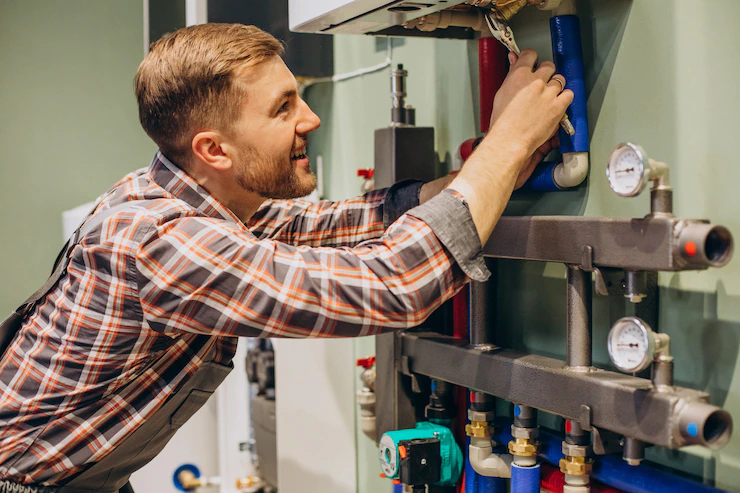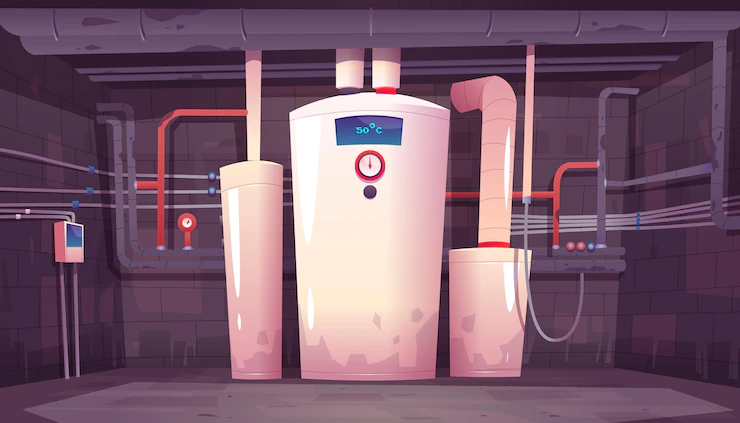7 Ways To Avoid A Water Heater Disaster

Winter is coming with its cold, and nothing is worse than stepping into a cold shower. Your reliable water heater works day and night to keep you warm and comfortable. But as it says, any hard worker needs some care.
In this blog, I’ve discussed some very simple yet necessary water heater tips. We’ll see easy and regular maintenance tips, and you know how you can note possible problems.
Through simple steps, your water heater will stay in good condition, which will save you unnecessary money and trouble later on.
Alright then, let’s get rolling and forget all these winter blues.
Types of Water Heaters
There are various types of water heaters that you may find in the marketplace. So, you can choose the water heaters that per your needs and necessities. Read on to find out the top types:
Storage water heaters: This is the most common type of heater that comes with a large tank. These heaters are adequate for your everyday use. However, it may not be enough for a huge number of guests or users.
Tankless or demand-type water heaters: This heater usually heats the water directly. There is no storage tank. You can use these heaters to provide enough water without running out of water.
Solar water heaters: These specific heaters mainly use the sun’s heat to provide hot water. Solar water heaters can be the most energy-efficient and eco-friendly option for you.
Heat pump water heaters: These heaters are capable of moving heat from one place to another instead of generating direct heat. The heat pump water heaters are more efficient than electric resistance waters. However, these are also very expensive to purchase.
Gas water heaters: These specific water heaters utilize gas to heat the water.
Electric water heaters: These water heaters are a type that uses electricity to heat the water.
How Water Heaters Work
Water heaters mainly work by heating cold water and storing it in a tank. There are heaters that heat water on demand without any kind of storage tank.
The storage water heaters usually have a tank that stores the hot water. This hot water is released when you turn on the hot water tank. The cold water mainly enters the bottom of the tank through a tube. Furthermore, it is heated by a burner or element.
After that, the heated water rises to the top of the tank and is further discharged through the hot water outlet.
On the other hand, tankless water heaters heat the water when there is a demand for so. When you are turning on the hot water tap, the cold water starts to follow through the heat exchanger.
During this process, the water is heated by water or any similar elements. The tankless water supply helps to provide a continuous supply of water. However, it comes with a very limited flow.
Here Are Seven Prime Ways To Avoid A Water Heater Disaster:
1. Never Ignore Issues

Water heater issues such as unfamiliar noises, leaks, or decreased hot water production are warning signs of something wrong. If you notice any of these problems, don’t ignore them.
Call plumbing repair experts to have a look as soon as possible. Other minor issues, such as sediment buildup, can be fixed with a simple flush. However, if you wait too long, the problem could worsen.
2. Know the Age of Your Water Heater
The average lifespan of a water heater is 8 to 12 years. If your unit is getting older, it’s more likely to experience problems. Have a professional inspect it regularly to catch any issues before they become significant.
Replace the heater before it completely breaks down to avoid being left without hot water. Go for a system that adequately meets your household’s needs, such as a tankless water heater. An energy-efficient model will help you save on utility bills.
3. Don’t Overlook Maintenance

Flushing your water heater regularly is one of the most critical maintenance tasks. This simple task removes sediment from the bottom of the tank that causes problems such as decreased hot water production and shortened lifespan. Most manufacturers recommend flushing once per year.
If you have hard water, flush more often. Other tasks include checking the anode rod and keeping the area around the unit clear of debris. Remember to shut off the power before performing any maintenance tasks.
4. Check the Temperature
If your water heater is set too high, it could be a safety hazard. The U.S. Consumer Product Safety Commission recommends setting temperatures no higher than 120 degrees Fahrenheit to prevent scalding. Doing this will also save on utility bills. Adjust the temperature by finding the thermostat on the unit and turning it to the desired setting.
5. Be Careful About What You Store Nearby

Don’t store flammable liquids like gasoline or propane near your water heater. If there’s a gas leak, it could cause an explosion. Also, keep the area around the unit clear of clutter to prevent accidental fires. If you have a gas water heater, ensure proper ventilation.
6. Check Whether There’s Rusting
Water heater rusting is due to the corrosion of the metal tank. It’s often caused by hard water or a build-up of sediment in the tank. Extensive rusting leads to leaks. Eventually, the tank will need replacement. To prevent this, flush the water heater regularly and have it inspected by a professional every few years. Also, install a water softener if you have hard water.
7. Inspect The Sacrificial Anode Rod

The sacrificial anode rod protects the water heater tank from corrosion. Over time, the anode rod will rust, requiring a replacement. Replacing is a simple task that you can do yourself. Simply remove the old anode rod and screw in a new one. Follow the manufacturer’s instructions.
Choosing the Right Water Heater for Your Home
When you are choosing a water heater for your home, you can consider the following things:
Capacity: The size of your water heater should meet the hot water needs of your household. You must include the number of people who are going to use the hot water.
Energy efficiency: When you are buying a water heater, try to look for a high energy factor or EF rating. This way, you can easily save on your energy bills.
Safety: Look for a water heater that has safety features such as pressure relief valves, automatic shut-off, and shock-resistant plugs to identify if there is any leak.
Installation space: Always ensure that you have enough space in your house for the type of water heater you are buying.
Type of fuel: Before buying the water heater, always try to consider the availability as well as the overall cost of the fuel type that you are going to use in your water heater.
Aesthetics: Water heaters come in various designs and finishes that might suit your taste. You can also go for one that totally complements your kitchen as well as bathroom or your kitchen.
Features: You may find some water heaters that come with features like digital displays, smart alerts, and remote control.
Common Water Heater Problems and How to Fix Them
Water heaters are important, but they can cause problems. Common problems include no hot water, unusual sounds, or water that is too hot or not hot enough. If you have no hot water, check the thermostat or pilot light.
Strange sounds might mean there is sediment buildup, which you can clean by draining the tank. If the water temperature changes a lot, a broken thermostat or heating element might be the cause.
Maintenance Tips to Extend the Life of a Water Heater
Inspect the tank annually and clean it to remove whatever sediment has been building up, check the anode rod for corrosion, and assess if the valves leak. Cleaning and maintenance should be maintained regularly around the water heater.
If it’s more than 10 to 15 years old, then it is time to replace the water heater. Its high energy bill or constant repair indicates that the time to replace the unit is now.
Benefits of Upgrading Your Water Heater
Upgrading your water heater offers some great benefits. First, you’ll enjoy energy savings. Newer water heaters are built to be more energy-efficient, meaning they use less power to heat water, which can lower your utility bills over time. You’ll notice a significant difference in costs, especially if your old water heater was outdated.
Another benefit is improved performance. New water heaters heat up faster and maintain a more consistent temperature. This makes it so that you are less likely to run out of hot water, and you’ll have fewer temperature-related problems.
Upgrading does not cause harm to the environment. Modern water heaters are made to be environmentally friendly.
They use less energy and generate carbon emissions compared to older models. Making the switch will improve comfort and efficiency at home, which reduces your overall footprint on the environment.
Cost Considerations for Installing and Maintaining a Water Heater
Cost factors still play along in the installation and maintenance consideration of a water heater. Installation of a new water heater depends on the model and the size that one would choose.
Tankless models or energy-efficient heaters are pricey upon installation, but you will save money in the long term because your energy bills have lowered. Traditional tank water heaters are less expensive to install but less energy efficient.
Maintenance costs should also be included. Generally, regular maintenance can extend the life of your water heater, and some even have saved much money by preventing expensive repairs. Some of these include flushing the tank, checking the anode rod, and inspecting the heating elements. These are relatively low-cost but necessary to keep your system running at optimal levels.
Although the initial investment would be a little more, a good energy-efficient water heater can start saving you money over a period because it uses fewer amounts of energy and has fewer breakdowns.
Know When to Call a Professional
While you can do some simple maintenance tasks yourself, a professional should handle more complex issues such as leaks or strange noises. It’s better to be safe than sorry. Take time to learn how the unit works and what kind of maintenance it needs. You’ll catch problems early on, preventing disasters.
Read Also:











Leave A Reply